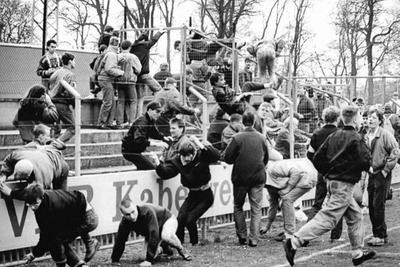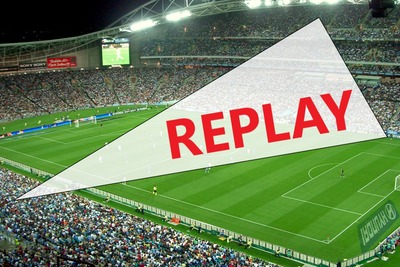Nowadays football matches are, thankfully, very rarely abandoned. It does happen, however, so you’re probably wondering why.
What is it that causes the abandonment of a game of football and what happens next?
We’ve had a look at the various reasons games might get called off and explored the options of where things go from there.
Bad Weather
 This is one of the most common causes of abandoned matches. Bad weather can come in many different guises, from such heavy rain that the pitch is unplayable through to the kind of thick, rolling fog that that makes it impossible to see your hand in front of your face. Perhaps somewhat understandably, weather tends to affect lower league games more than games at the top of the Football League.
This is one of the most common causes of abandoned matches. Bad weather can come in many different guises, from such heavy rain that the pitch is unplayable through to the kind of thick, rolling fog that that makes it impossible to see your hand in front of your face. Perhaps somewhat understandably, weather tends to affect lower league games more than games at the top of the Football League.
This is because teams in the Premier League and Championship tend to have more money than those in the likes of League One or Two. More money means better facilities that can better cope with adverse weather conditions. The best teams in the league have start-of-the-art draining systems and undersoil heating that means neither rain nor snow will be allowed to stop games of football being played on the pitch.
That said, it has been known for Premier League teams to call off matches because of the weather. Normally it is under the advice of the police who fear for the safety of supporters outside the ground rather than the conditions inside. In January of 2010, for example, six top-flight games were called off because of the snowy conditions around the grounds. Liverpool’s game against Tottenham was abandoned, despite the fact that the pitch was playable, because approach roads and areas around Anfield were icy and dangerous to walk on.
Liverpool were also the focus of one amusing weather-related incident in the 1960s. The FA Cup Fourth Round replay against Walsall was close to being called off because of heavy fog that had descended on the club’s home ground. The game went ahead, even though you couldn’t see the opposite side of the ground from the goalmouth. When Liverpool scored at The Anfield Road End, supporters on the Kop chanted, “Who scored the goal?” Those in the other end of the ground replied, “Tony Hately” and The Kop sang “Thank you very much” by The Scaffold in reply.
Lower league sides are typically more susceptible to games being abandoned because they are simply less able to cope with poor weather. If the pitch is soggy and muddy and the ball liable to get trapped in pools of water then the chances are that the referee will call the game off in consultation with the groundskeepers.
Generally, though not exclusively, matches are abandoned if it is deemed that the supporters are either at risk from the elements or else won’t be able to enjoy the game because of the weather. Fog limits what fans can see, rain limits how well the players are able to play and heavy snow might stop supporters of a team like Brighton being able to make it home after their game with Newcastle, for example.
Safety

Another reason that matches are abandoned is crowd safety.
In a famous modern day example, Manchester United’s game against Bournemouth on the last day of the 2015-2016 season was called off when a suspicious package, that looked like a bomb, was found in a toilet.
It turned out that a security company who had used the ground for a training exercise had left the device in the ground by accident, but a controlled explosion was carried out on it after all supporters had been evacuated.
An historic issue that caused games to be abandoned was crowd trouble, particularly the vogue for ‘pitch invasions’.
If too many supporters were on the pitch with a significant amount of time still to play then it was deemed impossible for the game to continue and so it was called to halt.
Again, this is not so much of a problem in the modern era.
Floodlights

Matches played in the evening require the use of floodlights in order to ensure that both players and spectators can see the game clearly.
In incidents that floodlights fail the match tends to be abandoned if they can’t be fixed within a period of time.
There was a spate of floodlight issues in the top-flight during 1997 that caused a police investigation after allegations of wrong-doing were put forward.
Playing Staff Or Referees

It is unusual to say the least, but there have been instances of matches not going ahead because of the officials who were supposed to take charge of the game getting ill.
There have also been a few occasions when a game has been forced to be abandoned halfway through because one team had too many players sent off.
This occurred in the ‘Battle Of Bramall Lane” in 2002 during Sheffield United’s game against West Brom.
They were reduced to just six players because of sending offs, with the minimum amount recommended on one team being seven.
What Happens Next?
 Each country has its own rules and regulations about such things.
Each country has its own rules and regulations about such things.
In Spain, for example, a match that is already partway through isn’t abandoned, it is merely postponed to a later date. This means that if a game is halted after 68 minutes with one team 3-0 up then it will be resumed at a later date with the remaining 22 minutes played out.
Things are different in England, however. It is essentially at the discretion of the FA what happens if a game is abandoned after a period of play, as this extract from the Football League rules suggests:
”…any League Match which from any cause whatever falls short of 90 (ninety) minutes’ duration may be ordered to count as a completed fixture or be replayed in full or in part on whatever terms and conditions the Board shall in their absolute discretion determine and shall be played in compliance with these Regulations and the Football Association Rules respectively and under the Laws of the Game as approved by the International Football Association Board”.
If a game is called off before a ball has even been kicked then it is typically replayed at a later date, with the supporters offered a refund or replacement tickets for the new game.
